#Haidar al-Abadi
Explore tagged Tumblr posts
Text
‘I value King Salman’s friendship,’ tweets Iraqi PM on Saudi visit
‘I value King Salman’s friendship,’ tweets Iraqi PM on Saudi visit
Abadi was also attending the first meeting of a Saudi-Iraqi coordination council, which will cover various political, economic, security and cultural fields.
:: Iraqi Prime Minister Haider al-Abadi tweeted on Saturday that he felt “good to be back in Saudi Arabia,” adding that he “valued highly” King Salman’s friendship after the leaders met.
Abadi was also attending the first meeting of a…
View On WordPress
2 notes
·
View notes
Text
BAGHDAD (AP) — Hundreds of Iraqi protesters breached Baghdad’s parliament Wednesday, chanting curses against Iran, in a protest against the selection of a nominee for prime minister by Iran-backed parties.
Many protesters were followers of an influential cleric. Some were seen walking on tables and waving Iraqi flags.
No lawmakers were present. Only security forces were inside the building and they appeared to allow the protesters in with relative ease.
The breach came amid the biggest protest since Iraqi elections were held in October. The demonstrators were protesting the recent nomination of Mohammed al-Sudani as the official nominee of the Coordination Framework bloc, a coalition led by Iran-backed Shiite parties and their allies.
Earlier Wednesday, demonstrators, many among them the followers of an influential cleric, breached Baghdad's heavily fortified Green Zone to protest the selection of a nominee for prime minister by Iran-backed parties.
Riot police used water cannons to repel demonstrators pulling down cement blast walls. But many breached the gates to the area, which houses government buildings and foreign embassies.
The demonstrators walked down the zone's main thoroughfare, with dozens gathering outside the doors to the parliament building.
Riot police assembled at the doors to the main gates. Demonstrators crowded around two entrances to the Green Zone, with some scaling the cement wall and chanting, “Sudani, out!"
Caretaker Prime Minister Mustafa al-Kadhimi called for calm and restraint, and for protesters to “immediately withdraw” from the area.
The demonstrators were largely followers of influential Shiite cleric Muqtada al-Sadr, who recently stepped down from the political process despite having won the most seats in the October federal election. Protesters carried portraits of the cleric.
In 2016, al-Sadr supporters stormed the parliament in a similar fashion. They staged a sit-in and issued demands for political reform after then-Prime Minister Haidar al-Abadi sought to replace party-affiliated ministers with technocrats in an anti-corruption drive.
Al-Sudani was selected by State of Law leader and former premier Nouri al-Maliki. Before al-Sudani can face parliament to be seated officially as premier-designate, parties must first select a president.
Al-Sadr exited government formation talks after he was not able to corral enough lawmakers to get the majority required to elect Iraq’s next president.
By replacing his lawmakers, the Framework leader pushed ahead to form next government. Many fear doing so also opens the doors to street protests organized by al-Sadr's large grass roots following and instability.
12 notes
·
View notes
Text
Tunduk
Sejak WFH dan hari-hari mulai agak monotone, melihat apa yang ditulis di blog setiap hari seperti terapi sendiri. Setidaknya, saya bisa tahu bahwa setiap hari, ada topik berbeda yang bisa ditulis.
Hari ini, saya sarapan potongan terakhir Lemet Singkong alias Cassava Cake yang saya bawa dari rumah. Setelahnya, saya air kunyit sama jahe rebus. Kali ini kunyit sama jahenya dipotong-potong doang. Ternyata, dibanding diparut atau diblender, saya lebih suka dipotong-potong doang. Nggak terlalu pekat dan nggak seret. Jadi mirip minum teh aja. Dikasih gula merah dikit, berasa sedapnya.
Sepekan ini, jam tidur membaik. Saya tidur jam 10 dan bangun jam 3. Mood berasa baik banget. Saat tulisan ini dibuat, saya lagi nunggu Superindo deket kost buka. Soalnya persediaan sayuran habis dan Superindonya buka jam 10. Tadi jam 8 udah kesana. Ternyata masih tutup.
Akhirnya, saya tinggal sarapan bentar sambil video call sama temen dan menulis ini.
Subuh tadi, saya iseng membaca twitter dan melihat status pak Haidar Bagir tentang intelektualitas:
Intelektualitas seringkali bermakna kesediaan menanggung penderitaan untuk selalu berada dalam limbo & keraguan, untuk tak hendak memutlakkan pandangan, terus-menerus melihat pendapat kita sebagai tentatif dan terbuka untuk direvisi, berakar pada pengakuan penuh rendah hati akan relativitas pemikiran kita.
Twit ini mengingatkan saya pada banyak percakapan tentang agama yang menurut orang-orang agnostik terasa dogmatis dan menutup ruang bagi kita untuk berpikir dan mempertanyakan banyak hal. Di masa kecil, ketika saya belajar tentang fiqih, saya memang lebih banyak belajar menelan dibandingkan bertanya. Ketika dewasa, sayapun sempat berpikir bahwa agama memang dogmatis seperti itu. Semua sudah ditentukan dalam Al Qur’an dan manusia tinggal menjalaninya.
Maka kadang saya berpikir, tunduknya seorang muslim itu seperti robot yang kepalanya hanya berisi decision tree. Pada akhirnya, setiap pertanyaan tentang agama, membuat kita merasa bersalah karena sudah “menempatkan rasio di atas iman”. Jika manusia fitrahnya punya rasio, bagaimana mungkin Allah menciptakan paradoks bahwa manusia harus melawan fitrahnya sendiri untuk sekedar beriman?
.....
Ini bukan gugatan yang perlu diseriusi. Saya hanya menyimpannya di kepala. Tidak ada ajaran yang saya lawan. Saya hanya merasa perlu bersabar.
Ada kutipan yang bilang bahwa ilmu itu seperti lensa pada teleskop. Semakin canggih lensa yang kita punya, kita akan punya banyak sudut pandang baru yang menakjubkan. Maka sejak itu, saya jadi semakin berusaha tenang dan tidak pernah tergesa dalam bertanya.
....
“Kisah yang paling terkenal itu tentang Umar yang merubah skema pembagian ghanimah padahal skemanya sudah tertulis di Al Qur’an. Saya bukan ahli fiqih dan tidak bisa membahas semua lebih jauh. Tapi fiqih itu ada metodologinya. Mirip dengan disiplin ilmu kebijakan publik zaman sekarang”
“Sebagian orang beragama hari ini merasa bangga ketika mereka keras dan tegas. Kadang kalo ngelihat, agama itu seperti bermuka dua. Bisa aja orang kayak kamu lembut di awal. Tapi ketika benar-benar masuk mendalami agama, kamu mendadak keras“
“I’ve been there. Ngerasa lega sehabis menjalankan sesuatu. Ngerasa seneng juga kalo habis meluruskan orang hhaa“
“Terus sekarang iman kamu turun berarti?“
“Kita nggak pernah tau, perasaan itu ada karena iman atau karena sekedar bahagia aja karena merasa mendisiplinkan diri. Yang pasti, dalam kondisi taat atau enggak, saya punya perasaan bahwa Tuhan nggak pernah jauh. Saya bukan tipikal orang yang bisa khusyu lama dalam sholat. Tapi bisa khusyu kalau baca buku. Jadi saya suka ngomong dalam hati dan berharap baca buku itu dihitung ibadah. Biar amal saya pas ditimbang nggak ringan-ringan banget bobotnya”
“Emang bisa gitu?“
“Ya siapa tau“
“Kamu sebenarnya mengimajinasikan Tuhan seperti apa?“
“Di masa kecil, ada kitab namanya Aqidatul Awwam. Dalam kitab itu, penulisnya menjelaskan 20 sifat Allah. Dua di antaranya Maha Bijaksana dan Maha Berkehendak. Dua sifat itu yang selalu tertanam di kepala saya dan saya bisa bertahan hidup karena selalu membayangkan dua sifat itu. Tiap kali bertemu takdir yang tidak baik, tiap kali bertemu hal yang awkward tentang agama, manusia selalu bertanya. Sayapun juga”
“Lantas, apa Allah yang Maha Berkendak dan Maha Bijaksana tadi menjawab pertanyaan kamu? Lewat mimipi atau intuisi gitu?“
“Wkwk kamu kenapa selalu membayangkan orang beragama senaif itu dalam mencari wangsit? Awalnya, saya selalu berharap pertanyaan itu dijawab. Tapi belakangan saya menyadari bahwa Allah itu bukan dosen insecure yang kalo dituduh “nggak kompeten” sama mahasiswanya, langsung menunjukkan kemampuannya dalam banyak hal. Dia Maha Bijaksana dan Maha Berkehendak, dua sifat itu membuat saya menyadari bahwa tindakan-Nya di luar kehendak makhluk. Kalau dia ngasih saya sesuatu setelah saya berdoa, itu berarti dia sedang berkehendak. Bukan karena saya sedang mengarahkan kehendak-Nya“
“Lha lantas buat apa berdoa kalau misal Allah Maha Tahu?“
“Kalau ada suami isteri yang udah pasti tahu bahwa mereka sayang satu sama lain, buat apa mereka masih berkirim pesan dan bilang kangen? Kadang, saya berdoa biar lega aja sih“
“Kamu pernah menanti keajaiban?“
“Enggak. Saya tidak beragama dengan cara seperti itu hwkwk“
“Sebagian besar orang baru percaya Tuhan itu ada setelah ada keajaiban“
“Jadi mereka selalu berharap bahwa Tuhan bersikap seperti dosen insecure tadi ya?“
“Agama bagi sebagian orang itu seperti sumber keajaiban“
“Sewaktu Ibu sakit kanker, saya awalnya berdoa dan berharap ibu hidup lebih lama. Tapi saya inget bahasan tentang takdir dari Syaikh Ash Shallabi bahwa Allah menciptakan sunnatullah salah satunya hukum-hukum alam yang kita pelajari hari ini termasuk cara kerja sel kanker. Jadi, kalau misal sel kanker itu jadi jalan kepergian ibu, saya sudah ridho meskipun sebagai anak yang dari kecil sangat bergantung ke ibu, saya nggak tau apakah setelahnya saya mampu bertahan. Maka doa saya waktu itu, saya minta Allah menghadirkan banyak teman untuk bicara. Biar saya bisa melanjutkan hidup“
“Saya awalnya nyangka kamu nggak rela ibu kamu pergi”
“Saya sama ibu, ridho sejak awal beliau didiagnosa. Sore-sore di Husada Utama, saya habis ngambil hasil tes PA. Waktu itu hujan deras. Cuma ada saya sama ibu. Saya menangis keras. Ibu saya cuma bilang “Nggak apa-apa. Lanjutkan hidup kamu. Ibu nyoba kemo. Tapi kalau nggak berhasil, kamu harus kuat”. Kami berdua sebenarnya sama-sama sadar kalau perpisahan kami nggak bakal lama. Tapi kami sama-sama nggak berani membahas itu. Ibu belajar ikhas dengan sakitnya. Saya cuma berdoa agar Allah mengurangi rasa sakit ibu dan berharap tidak ada satupun fungsi indera yang diambil saat ibu sakit. Saya nggak mau lihat ibu nggak kuat jalan, nggak bisa bicara atau apapun. Alhamdulillah Allah mengabulkan itu. Saya diam dan menanggung beban ini selama 6 bulan tanpa bicara apapun ke Bapak atau Mas. Yang perlu kamu tahu, trauma itu bukan karena enggak ridho. Bukan karena nggak beriman. Bukan karena Allah enggak sayang. Itu karena kehendak-Nya“
“Ketika kita beragama, boleh nggak sih kita mempertanyakan adilnya Tuhan? Semisal Dia emang sayang sama kamu, kenapa Dia nggak menyembuhkan Ibu kamu?“
“Dunia itu sementara. Setelahnya, ada akhirat yang abadi. Nggak ada manusia yang selamanya di bumi. Saya tidak sampai mempertanyakan keadilan Tuhan dalam hal ini karena nalar saya selalu membawa ke arah lain”
“Jadi dimana letak ruang kritisnya?“
“Kamu jangan selalu mikir kritisnya saya seperti kritisnya orang yang belajar Al Quran hanya demi mengkritisi ituuuu wkwk“
“Ya gimana yaaaa. Kamu tuh lempeng aja orangnya. Jadi saya mikirnya kamu iya-iya aja. Ya sama dogmatisnya“
“Kan saya tadi udah bahas Umar“
“Tapi belum nangkep“
“Dalam islam, ada dua sumber hukum utama. Al Qur’an dan Hadis. Untuk merumuskan jadi hukum, Al Qur’an dan Hadis butuh diinterpretasikan sama ulama. Dalam islam, ini masuk disiplin ilmu tafsir. Nah, salah satu ruang kritisnya ada di tafsir ini. Bagaimana sebuah ayat bisa kita anggap punya makna begini, begitu dan seterusnya“
“Berarti tafsir itu relatif?“
“Tetap ada metodologi yang harus diuji. Bukan relativitas absurd tanpa batasan. Makanya yang menafsirkan Al Quran harus punya kapasitas tertentu. Yang tahu requirement pastinya ya tetep orang tafsir sih. Orang awam kayak saya mah ga tau dalem“
“Ada tingkatannya gitu ya?“
“Yhaa emang kamu mikir semua muslim faham Al Quran?“
“Tadinya“
“Ustadz yang di TV aja belum tentu punya kapasitas ilmu untuk menafsirkan ayat. Makanya ketika ada ulama membuat fatwa, orang kayak saya sangat berhak buat nanya dasar fatwa tersebut apa. Bukan buat meragukan kualitas ulama tadi. Tapi lebih ke menjaga budaya transparansi. Karena sesuatu yang ilmiah itu harus diuji secara transparan. Seorang intelektual harus ikhlas kalo dikritik. Harus ikhlas kalau dibilang metodenya salah. Harus mau bicara dengan logika yang runtut kalau nemu metode yang salah. Kalau baca kisah Umar lagi, kamu bisa ngelihat ada banyak kebijakan dia yang diteliti dan logikanya jelas. Beragama, bagi saya harus mengabdi dengan sikap seorang intelektual”
“Tapi beragama itu maknanya tunduk. Kamu nggak bisa bikin makna sendiri”
“Saya nggak bikin makna sendiri. Saya justeru menggungat makna agama bagi orang-orang di generasi saya dengan makna agama bagi orang-orang terdahulu“
“Bagaimana kita bisa menempatkan tunduk dan menggugat secara sejajar?“
.....
Ketika membaca twit pak Haidar Bagir, saya jadi ingin menulis lagi tentang ini:
Kita beragama dengan tunduk kepada Allah dan menggugat penalaran manusia. Dalam menentukan hukum, bagaimanapun, masih ada interpretasi manusia di dalamnya. Di sini diperlukan kerja keras untuk memastikan ayat Al Qur’an atau hadis diinterpretasikan seakurat mungkin. Maka tidak masalah kita mempertanyakan apapun, tapi bertanyalah dengan baik. Seperti murid yang bertanya kepada gurunya. Bukan seperti orang bodoh yang tidak terima dengan segala macam aturan yang tidak dia pahami. Bersikap intelektual itu artinya bekerja keras untuk selalu membuka pandangan seluas-luasnya. Ridho ketika dikritik. Tidak takut dan tidak arogan ketika mengkritik. Kita semua manusia. Sudut pandang dan wawasannya tidak sempurna. Tapi siapa tahu kerja keras kita dapat dinikmati generasi-generasi selanjutnya agar mereka bisa mengembangkan pertanyaan yang lebih baik, memiliki kepribadian yang lebih rendah hati, sementara di sisi lain tidak gentar untuk kritis ketika melihat ketidakadilan
Berusahalah biar ilmu itu mengalir seperti air jernih.
Kalaupun suatu saat kamu berpolitik praktis, berusahalah ilmu itu tetap jernih. Kamu yang harus tunduk pada ilmu. Bukan ilmu yang harus tunduk pada pandangan-pandangan partisan kita. Ilmu yang harus meluruskan langkah kita. Bukan kita yang membuka buku hanya sekedar mencari legitimasi.
Bersikaplah sebagai intelektual sebagai bentuk ketundukan kepada Allah.
Dan katakanlah, “Bekerjalah kamu, maka Allah akan melihat pekerjaanmu, begitu juga Rasul-Nya dan orang-orang mukmin, dan kamu akan dikembalikan kepada (Allah) Yang Mengetahui yang gaib dan yang nyata, lalu diberitakan-Nya kepada kamu apa yang telah kamu kerjakan.” (QS. At-Taubah: 105)
57 notes
·
View notes
Link
https://kurdnet.tumblr.com/
0 notes
Text
Iraq: A military parade in Baghdad to celebrate the victory of the Islamic State
Iraqi Prime Minister Haidar al-Abadi announced on Saturday a military parade to celebrate the “military victory” over the organization of the Islamic state. In the area of the unknown soldier’s monument, in the heavily guarded Green Zone, where the main headquarters of the ministries and embassies, especially the United States and the British, were stationed in different parts of the various…
View On WordPress
0 notes
Link
While the so-called Islamic State (ISIS) has lost control of its statelet in Iraq and Syria, the war against the remnants of the organization is not over, despite President Trump's claim to the contrary. Anti-Assad rebels still control various parts of Syria with non-ISIS jihadis controlling Idlib in the northwest and the Kurds commanding the northeast. Fighting over these enclaves will likely occupy the immediate future. In addition, any "deescalation" agreements remain subject to collapse or cancellation at the convenience of Assad and his backers. But the longer-term question is what happens next? Will the wars in Syria and Iraq finally end, or will there be another round of insurgencies? And will ISIS again go underground to rebuild as it has before?
The Situation on the Ground
While ISIS and other groups have made preparations for going underground to resume an insurgency, the success of such efforts depends on at least two factors: how well the Syrian and Iraqi governments reestablish effective governance and security and are able to identify and root out the rebel infrastructures; and whether these governments can manage reconstruction and reconciliation, especially reintegration of Sunni Arabs.
Governance and security. Reestablishing effective governance and security requires that national governments enforce and maintain effective control over areas previously held by ISIS or other insurgents. If the governments succeed, it will be much harder for opposition groups to go underground and remain functional.
But restoring security will be extraordinarily difficult. For a start, the anti-ISIS war is not over. Though their command structure has largely been shattered, there are still residual ISIS pockets and cells to dig out. Moreover, the parts of ISIS most likely to have survived—senior commanders and the security apparatus—are the parts most able to regenerate the organization. The war against the terrorists has also been only one aspect of the multi-sided civil war in Syria. There are ample opportunities for further wars there and in Iraq. These may be driven by rival nationalisms: Turkey has demonstrated its readiness to go to war against the Kurds in Syria and has occasionally talked about enlarging its borders, and Iraqi Kurds unsuccessfully tried to do so. Factional rivalries and competing ambitions between regional states as well as Israel's sustained efforts to prevent Iran's military entrenchment in Syria could lead to a wider conflagration. Various Sunni states may be prepared to continue support of Sunni factions as a way to distract Iran and other enemies or may look the other way when factions within those states give such support.
It is also possible that the Middle East is in the opening round of multiple civil and proxy wars within Islam: between governments and movements that have weaponized Shiite and Sunni Islam; between Shiite factions allied or opposed to Iran, and among the Sunni jihadists. These wars are likely to be protracted and bloody and will further increase religious polarization and violence within the region and within Islam as a whole, and can potentially destabilize much of the Middle East.
The capabilities of both the Syrian and Iraqi governments are limited; their ability to effectively govern and conduct long-term counterinsurgencies is uncertain. While the collapse of the Iraqi security forces in the face of ISIS has been widely noted, the collapse of the Syrian military was even more comprehensive. The Baghdad government and the Assad regime have only partially recovered, with many of the forces nominally aligned with them in reality being factional militias that serve their own agendas or those of foreign sponsors. This is most prominent in Iraq where the Kurds are effectively an autonomous government and where major parts of the Popular Mobilization Forces militias created in the aftermath of the 2014 Iraqi security collapse are under Iranian control. It is also the case in Syria where its Kurds also desire autonomy and where many militias such as the Lebanese Hezbollah function independently of the Assad regime. Will these forces accept and support government policies with which they (or their patrons) disagree? Or are they more likely to pursue their own agendas, if necessary at the expense of the national governments they nominally support?
Reconstruction and reconciliation. National reconstruction and reconciliation, especially reintegration of the Sunni Arabs, will present uphill struggles. First, there is some question about how much reconstruction the Iraqi and Syrian governments will be able to undertake even with foreign aid. Much of each country has been economically, socially, and physically devastated, both by ISIS rule and by the wars to drive the organization out and their aftermaths.
Large parts of Syria have been devastated by the civil war unrelated to ISIS. There are also millions of refugees, mostly Sunnis, which the Assad regime will likely be reluctant to resettle. Meanwhile, both the Iraqi and especially Syrian governments are effectively bankrupt. Assad's war has been largely bankrolled by Tehran, and his Russian and Iranian patrons are unlikely to be inclined or able to fund the enormous reconstruction costs, estimated to be between $250-300 billion. A preliminary World Bank estimate of Iraqi reconstruction costs from February 2018 was $88 billion. The Trump administration is also unenthusiastic about nation-building, and as of March 2018, had pledged only a $3 billion line of credit. And while the Persian Gulf monarchies have made promises to Iraq, and Riyadh has cautiously opened up to Baghdad to push back against Iranian influence, it remains to be seen whether these governments will actually come up with the money.
Meanwhile, the rest of the international community is likely to experience donor fatigue. Beyond this, is the question of how much of the available money will get to the Sunnis who have been hardest hit: As of early 2019, the Iraqi government had provided virtually no reconstruction money to Ninevah province, which includes Mosul). To whatever degree Syrian and Iraqi Sunni Arabs manage—or are allowed—to recover may be in spite of policies of their governments rather than because of them.
As for national reconciliation, while the Damascus and Baghdad regimes may have made some efforts in that direction in the past, the situations do not look promising. The continuing wars against rebels in Syria will likely be hard and protracted. It is all too likely that ultimately the victors (especially the Assad regime) will pursue a vindictive peace in an atmosphere of religious polarization and widespread individual and group hatred and revenge. Even now, the Assad regime has been confiscating and selling the properties of refugees and those considered rebels.
It is unclear how much the Assad regime will even try to reconcile its Sunni subjects. The Syrian president has made clear his intent to reconquer militarily all of the country, and one must expect the same brutal tactics he has used so far. Assad prefers brutality since his aim is not only to win the war but to intimidate the survivors. The idea that one cannot kill one's way out of an insurgency is a Western conceit that others, especially the Russians and Middle Easterners, dismiss with contempt—after all, that is precisely what Bashar Assad's father did to put down a rebellion in the early 1980s.
In Iraq, the previous government of Prime Minister Haidar Abadi made efforts to reconcile the Sunni Arab minority and protect it from blood revenge and collective tribal responsibility for the actions of individual members. Current prime minister Adil Abd al-Mahdi appears to favor a moderate policy, but how much he can actually deliver remains to be seen. He has no independent power base, controls his own government only partially, and has limited or no control over many of the Shiite militias of the Popular Mobilization Forces, who are frequently supported or controlled by Tehran and have driven a sectarian agenda. Meanwhile, it is reasonable to expect that the popular sentiment of much or most of the Shiite and Kurdish populations, not to mention the surviving non-Muslim religious minorities, favor punishing the Iraqi Sunni Arabs for being pro-ISIS or insufficiently anti-ISIS. Villages and tribes often take their own retribution whether it is government policy or not.
Clearly, there are ample grounds for pessimism.
The Future of ISIS

But the situation does not necessarily favor ISIS as the requirements needed to function underground may work against it. While there remains an atmosphere of massive Sunni grievance and a power vacuum that ISIS could theoretically exploit, how well it will be able to do so is still a question.
For a start, since foreign fighters have been killed, captured, or have fled and not been replaced, ISIS has reverted to being more and more Syrian and (especially) Iraqi. Foreign fighters provided much of the core strength of ISIS and replacing them will be difficult. But even if they stayed, these foreign fighters would be ill-suited for underground resistance in their host countries. Thousands of them came from outside the Arab world, in particular the West, sub-Saharan Africa, Asia, and areas of the former Soviet Union, and are likely to speak Arabic poorly and to appear non-Arab. These foreigners, as well as Arabs with non-Syrian or non-Iraqi Arabic accents, or for that matter anyone non-local, are likely to get close attention from the security authorities, hindering them going underground.
Various world, national, regional, and local security forces will also be trying to identify, locate, and eliminate ISIS holdouts gone underground. In the Mosul campaign alone, the Iraqi authorities had more than 30,000 suspects' names in December 2016, and by January 2018, had some 6,000 captured ISIS suspects awaiting execution. In addition, some factions may not be waiting on legal niceties. Local and regional services, in particular the Assad regime's, can be expected to err on the side of excess.
ISIS also made many other enemies who will be out for revenge. Syria's conflict, in particular, has been a multi-sided civil war with ISIS fighting many other anti-Assad factions, including nationalists and various other jihadists. The situation has also been complex in Iraq. Even if ISIS did have some local support that was not coerced or opportunistic, it ruled as conqueror even at the expense of local allies. Indeed, its first purge after taking over Mosul was of former allies. In particular, ISIS and al-Qaeda factions in Syria have spent extensive time and effort killing each other, and there are irreconcilable major differences between ISIS and al-Qaeda Central, particularly over leadership of the global jihadist movement. These conflicts can be expected to continue underground.
Finally, popular resentment of ISIS's brutal tactics has produced numerous personal grudges to be settled. An obvious way to settle scores will be to turn in ISIS fighters to the security forces. Financial rewards would be a further incentive. And if government screening seems too lenient, or corrupt, individuals personally may target ISIS members for revenge killings.
ISIS is thus unlikely to have the same favorable atmosphere to maintain or rebuild its underground structure as previously, especially in Mosul, where its predecessor organization, al-Qaeda in Iraq/Islamic State of Iraq, was never really removed even when the U.S. military was present in force, and in Syria, where the Assad regime had tolerated, if not supported, their operations against the coalition in Iraq. ISIS may retain a degree of control in some pockets, but many of its survivors are likely to give priority to their own survival, not continuing the war. They may also turn to crime.
Another complicating factor for ISIS will be losing its claim of the right to rule. Aside from the loss of legitimacy due to losing a war and bringing vast devastation to the people on whose behalf the war was supposedly fought, as ISIS tries to return to the underground its narrative will have been discredited. It will only be able to spin defeat for so long. It is much more difficult to argue from failure than from success, and the physical and psychological attractions of the "caliphate" will no longer exist. ISIS will be unable to offer the thrill of being a warrior for God and a licensed outlaw, or promise the availability of sex slaves for unmarried young men, or the expectation of living in a truly Islamic utopia.
Much of the support ISIS received, especially foreign, was due to its claim to be a genuine state in control of territory and its apparent success in routing its enemies. Previously, ISIS could claim to be living up to its motto of "Remaining and Expanding." The self-named "caliph" Abu Bakr Baghdadi claimed his exalted position by right of conquest. Since these successes were considered manifestations of God's favor, what will happen now that those are gone? At what point will it become impossible to ignore that God is no longer intervening on their behalf or that the state Baghdadi claimed to rule is no longer on the map? Assuming Baghdadi has not fled, it will be difficult for him to claim to be ruler of much of anything. He is unlikely to find sanctuary in a neighboring state—such as al-Qaeda Central and the Taliban had in Pakistan and Iran after 9/11 and the previous iteration of the Islamic State had in Syria. However, Turkey remains a remote possibility as the Erdoğan government has been suspiciously lenient toward ISIS and may hope to use ex-ISIS fighters against the Kurds. If Baghdadi is shown to be killed, it will automatically dissolve all oaths of allegiance made to him, which will both dissolve the organization and leave the survivors up for grabs.
The Other Insurgents
While ISIS may find it difficult to recover, these difficulties may not apply to other insurgent groups, in particular Hayat Tahrir ash-Sha'm (HTS) in Syria and whatever Sunni nationalist groups have managed to survive in Iraq.
Hayat Tahrir ash-Sha'm. At one time known as al-Qaeda in Syria, Hayat Tahrir ash-Sha'm split off from ISIS (and also from al-Qaeda) and is, aside from the ambiguous case of the Syrian Kurds, probably the largest of the remaining non-ISIS, anti-Assad factions. Significantly, it appears to have learned from past mistakes and gradually modified its strategy and tactics from those previously standard to al-Qaeda. It may even have made these changes in spite of the policy of al-Qaeda Central, as did other al-Qaeda affiliates and branches, especially in Yemen and Mali. Among its major adaptations,
It has sought to collaborate and build alliances with existing Islamist (or even non-Islamic) rebel groups and to a degree reflects their concerns. It has thus selectively prioritized local rather than international operations, which means it can potentially tap into significantly larger reservoirs of support than ISIS, such as other jihadists that ISIS has alienated. It can also exploit latent support for jihadism and appeal to the substantial portion of Islamic opinion that is functionally radical by claiming to wage a defensive jihad rather than an offensive one.
Instead of trying to impose its version of Shari'a immediately, it has sought to do so gradually, pursuing what might be called jihadization from below, intending to cultivate a base of support and ultimately build a mass movement.
It has been more selective, or at least less indiscriminate, in targeting of terrorist attacks. In 2013, Aymann Zawahiri, leader of al-Qaeda Central, instructed al-Qaeda to avoid mass casualty attacks, especially those that kill Muslim civilians.
To deal with the collapse of governments, it has tried to set up a governing structure and enforce order. In Syria, it has assumed control of courts and law enforcement, leaving other administration to other groups.
For these reasons, and especially in comparison to ISIS, Hayat Tahrir ash-Sha'm has come to be considered a "moderate" extremist group, the only one that could plausibly provide other factions with protection from ISIS. These changes have the potential to make it appear less foreign, gain some local support, and at least significantly reduce the reasons for al-Qaeda's past loss of popular support. In particular, a degree of local support may enable Hayat Tahrir ash-Sha'm to maintain an underground organizational structure in Syria even if its current enclave in Idlib is overrun.
Iraq's Sunni Arab nationalist groups. The situation is different in Iraq. There the al-Qaeda brand has likely been profoundly damaged by ISIS as the direct descendent of al-Qaeda in Iraq/Islamic State in Iraq and the murderously bloodthirsty Abu Musab al-Zarqawi; al-Qaeda cannot claim any separation between itself and ISIS. Further, in Iraq, ISIS has pretty much monopolized the jihadists. However, this handicap does not necessarily apply to other insurgents, especially Sunni Arab nationalist groups. Prior to ISIS, the most significant of these was the Jaysh Rijal at-Tariqa an-Naqshbandia (JRTN, Army of the Men of the Naqshbandi Order /Naqshbandi Army). This is a nominally non-sectarian (though it claims some roots in Sunni-Sufi Islam) and neo-Baathist organization formed by Izzat ad-Duri, one of Saddam Hussein's top chieftains, after the Iraqi dictator was executed. Largely composed of Saddam-era military officers and officials, it aims to restore the Baathist system. In late 2014, it was considered the second most powerful Sunni insurgent force in Iraq after ISIS, with at least some degree of popular support. In the past JRTN has operated with and hired other groups, using them as a force multiplier. Initially it cooperated with ISIS (which designated a former Baathist general from the JRTN as the first governor of Mosul when it took over), but in 2016, it claimed to be attacking ISIS when coalition forces began the recapture of Mosul. However, at present, no additional information is available on the JRTN, its ties with other groups, with other Sunni nationalist groups, its present situation, or whether the group survived ISIS.
Conclusions
While ISIS may intend to resume its underground existence in Syria and Iraq, this may turn out to be much more difficult than expected. Although at first glance, the postwar environment may appear fertile for the terror group to pursue such a strategy, there are other factors that may make it difficult for ISIS fighters, especially foreigners, to go underground—in particular, widespread factional and popular hostility to ISIS and the loss of theological/ideological and functional legitimacy due to defeat.
But while ISIS may be less of a threat than commonly supposed, this does not mean it will not be a threat at all. ISIS survived and recovered from a previous massive defeat in Iraq because its enemies did not finish the job of eradicating it—a situation with ominous parallels to the present. Even more important, ISIS is not the only force of insurgents in the field, especially in Syria.
Hayat Tahrir ash-Sha'm, ambiguously an al-Qaeda offshoot, has modified its strategy and has pursued a long-game of sinking roots into Syrian society while pursuing jihadization from the ground up. Over time, the group is likely to absorb surviving jihadists from other organizations, possibly including ISIS survivors. Since there is no reason to believe that Assad will modify his murderous method of rule, one should expect at least one or more low-level insurgencies in Syria.
The present situation in Iraq is somewhat less acute, and the country has better prospects for recovery and reconciliation than Syria. But this depends on the Iraqi government effectively carrying out reconstruction and reconciliation policies. If this does not happen, it is reasonable to expect at least a continuing low-level insurgency, either by ISIS remnants or, more likely, by Sunni Arab nationalists.
There is not a great deal Washington can do to influence events in either country. If recent Middle Eastern history teaches anything, it is that one should never underestimate local players' ability to make bad situations even worse.
5 notes
·
View notes
Text
Iraq ‘could use force’ if Kurdish referendum leads to violence
Iraq ‘could use force’ if Kurdish referendum leads to violence
A still image taken from a video shows Iraqi Prime Minister Haider Al-Abadi speaking as he makes a statement on Tal Afar.
:: Iraq is prepared to intervene militarily if the Kurdish region’s planned independence referendum results in violence, Prime Minister Haider al-Abadi told The Associated Press in an exclusive interview Saturday.
If the Iraqi population is “threatened by the use of force…
View On WordPress
1 note
·
View note
Text
Iraq: Twin suicide bombings hit central Baghdad
Iraq: Twin suicide bombings hit central Baghdad
At least 28 people have been killed and scores wounded following a twin suicide bombing in Iraq’s capital Baghdad this morning. It is the first suicide bombing to hit the city in nearly two years, and the first in three years to target the same commercial area, shortly after then-Prime Minister Haidar Al-Abadi declared victory over Daesh. The “double explosion” struck a busy market in the Bab…
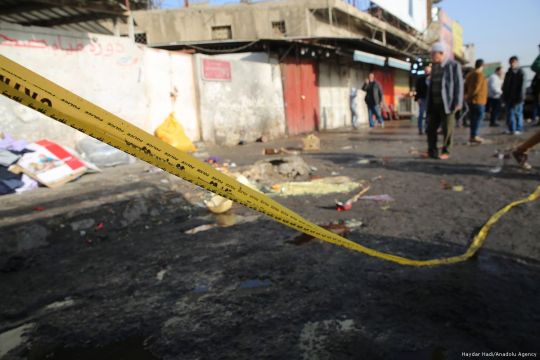
View On WordPress
0 notes
Text
Iraq’s best hope is developing stronger ties to the Gulf — with US help
New Post has been published on http://khalilhumam.com/iraqs-best-hope-is-developing-stronger-ties-to-the-gulf-with-us-help/
Iraq’s best hope is developing stronger ties to the Gulf — with US help

By Ranj Alaaldin As Iraqi Prime Minister Mustafa Al-Kadhimi made his way to Washington, D.C. for talks at the White House Thursday, he left a country that is mired in crisis. Iraq’s political environment is deeply fractious, and there are ongoing protests over socio-economic grievances. Its economy faces possible collapse amid the decline of oil prices and the fallout from U.S.-Iran tensions. All of this has destabilized its security environment, and of course occurs in the midst of the COVID-19 pandemic. The urgency of addressing these challenges is not lost on the prime minister, who came into office in May in the midst of these crises. He has framed his government as a transitional one, determined to restore some stability to the country. But how can Kadhimi overcome all these challenges? The road to recovery will be beset with wide-ranging, inter-connected problems as a deeply beleaguered population looks for some reprieve from the devastation and conflicts of the past two decades. Yet, Iraq’s single most important path to recovery may come in the form of closer ties to the Arab Gulf states. To date, Gulf monarchies have not invested significant energy and resources in Iraq, while their U.S. and European partners have struggled to enable pathways for increased Gulf investments in and support for Iraq as they sought to stabilize the country during the anti-ISIS campaign in recent years. With U.S. support and leadership, Iraq can become re-integrated into the Arab world, re-invigorate a relationship with the Gulf that is based on mutual interests to help revive the Iraqi economy, and reduce its dependence on Iran in the process.
A brief history
Iraq’s relations with Gulf Cooperation Council (GCC) states have been unstable and strained since the 2003 invasion of Iraq, after which the country became a staging ground for proxy conflict and political warfare between Iran and the Arab world. Relations reached their lowest point under Prime Minister Nouri al-Maliki, particularly after the 2011 Arab Spring when Iraq’s powerful political and religious figures backed Shiite protesters in the Gulf. Maliki alienated much of the Arab world, while his sectarian policies and the marginalization of Arab Sunnis further alienated the GCC monarchies. Meanwhile, the GCC has lacked a cogent, long-term, and strategic Iraq policy, and certain Gulf countries stand accused of actually funding militant groups in Iraq that have been responsible for wide-ranging terrorist attacks. The U.S. shares some of the blame for the deterioration in relations. It moved to back Maliki in 2010 after the country held parliamentary elections, paving the way for the increasingly authoritarian leader to form a coalition and suppress his Arab Sunni political rivals. In many ways, this convinced the GCC that Iraq was effectively a lost cause. There have been some glimmers of hope, like the 2017 bilateral engagements that saw Saudi Crown Prince Mohammed bin Salman promise investments in Iraq. That year, Adel al-Jubeir become the first Saudi foreign minister to visit Baghdad in decades, while the then-Iraqi prime minister, Haidar al-Abadi, visited Riyadh twice. But Iraqi domestic political dynamics have almost always hindered these efforts. It has not helped that the moderate Iraqi political actors who could champion and forge closer ties with the Gulf have suffered diminished authority. At the same time, Iran-aligned groups have ascended, strongly opposing the notion of stronger Iraq-GCC ties because it would hurt them politically, particularly if spearheaded by Washington.
Today’s picture
Currently, the Arab Gulf’s broad approach toward Iraq is three-fold: Where possible, engage diplomatically with Baghdad’s ruling elite, develop political and economic ties, and contain Iranian influence. Some Gulf states, like Kuwait, have had more positive relations with Iraq. Kuwait was the only state to have a strong presence at the Arab League Summit in Baghdad in 2012, and hosted the Iraq reconstruction conference two years ago. Saudi Arabia still has no ambassador in Baghdad, although it was reported in May that the Saudi ambassador to Iraq will resume his duties as soon as possible. Relations with Qatar are poor, in light of wealthy Qatari donors’ alleged funding to Iraq’s Sunni militants and the complicity of Iran-aligned groups in the kidnapping of Qatari nationals in 2016. Bahrain has had agitated relations with Iraq, particularly since 2011 after protesters mobilized against the government with support from the Shiite political class in Baghdad. The United Arab Emirates (UAE) has carefully cultivated strong, personalized relationships with key power centers and brokers, including powerful parties and figures in Erbil and Baghdad. It has a respectable reputation in Iraq for being a regional hub for innovation and trade. The UAE-based energy firm, Crescent Petroleum, has invested over $3 billion in Iraq and has a 20-year gas sales deal with the Kurdistan Regional Government. But Iraq-GCC ties are unlikely to flourish until the latter no longer views the former predominantly through the prism of its own domestic security considerations vis-à-vis Shiite communities in the Gulf, and until the former is able to truly forge its own foreign relations without submitting to Iran’s preferences. But that should not forestall attempts by the two sides to foster a strategic and sustainable partnership.
America’s potential role
What can the U.S. do? Unlike other issues and objectives (like holding free and fair elections to stabilize the country and restore the public’s trust in the state, or reining in militia groups), there is greater American capacity and influence to shape Iraq-GCC relations, given Iraq’s dependency on U.S. support and longstanding U.S. strategic partnerships in the Gulf. Washington should continue to help Iraq achieve its road map to energy independence, for one. This involves connecting the power grids of GCC states and Iraq to address Iraq’s chronic electricity shortage, which the Iraqi public has cheered and which provides some basis for a mutually beneficial relationship between Iraq and its neighbors. But this effort and others will be in vain if the contours of Iraq-Gulf relations are left primarily to anti-GCC or anti-U.S. forces to shape. The view from the Gulf will not look particularly good if GCC investments depend almost entirely on Kadhimi staying in power, and relying on Iraqi state institutions will fail if they (the institutions) succumb to Iranian influence. The U.S. already tried and failed with this approach when it devised a strategy that was based almost entirely on former prime minister Haidar al-Abadi’s capacity to stay in power; Washington promoted him in the region, but he was never well-received or seen as a strong and capable leader in the Gulf. He then came in an embarrassing third place in the 2018 elections, despite overwhelming support from the United States. Kadhimi has long-standing relationships with Gulf countries and has already been warmly received, as has his finance minister and deputy prime minister, Ali Allawi. But it’s problematic that Baghdad and the Kurdistan Regional Government (a longstanding U.S. partner) are currently embroiled in a major dispute over oil exports and revenue-sharing. That situation will have political and economic reverberations, and adds to Iraq’s already long list of challenges. Sequencing matters: If the U.S. is unable to help two of its most important allies in Iraq forge a durable settlement on oil, then the GCC will wonder whether or how Washington could forge a strategic partnership between Iraq and at least three other regional players in a move that could re-configure the geopolitical landscape. What the U.S. can and should devise is a set of guiding principles, a framework for forging what would effectively be a U.S.-GCC axis in Baghdad and a GCC-aligned political coalition in Baghdad that creates a sense of direction and a synergy between the extensive ties that some political actors already have with the Gulf. This would develop the modalities for a relationship that has long been needed. It allows for a milestone-based approach that mitigates and reduces the risk for GCC investments, one that moves away from the standardized emphasis on political stability in the country as a whole (which is unrealistic). Instead, it would make way for an emphasis on political stability between U.S. allies as a starting point, so that GCC economic investments in Iraq are tied to Washington’s ability to mediate disputes among its allies and the political consensus among the very groups whose ability to work together will be central to a refashioned relationship between Iraq and the Gulf. Creating a set of financial and diplomatic incentives and structures for this group of decisionmakers will help them overcome their fractiousness and orient Baghdad more toward the Gulf. That will serve to address the other underlying issue that comes with significantly enhanced GCC ties to Iraq: the threat from Iran. Through a combination of intimidation and coercion, Iran and its allies will torpedo enhanced GCC-Iraq relations, but its capacity to do so will be significantly constrained if it cannot exploit the divisions between their rivals and if its political muscle faces stiff resistance within the Iraqi parliament. The opportunity to translate the Gulf’s global standing, reach, and influence — as well as its trade hubs, access to international markets, and spending power — into political influence can, under U.S. guidance, revive a relationship that both Iraq and the region at large desperately need to achieve some reprieve from conflict and instability.








0 notes
Text
A new wave of Arab protesters say, ‘It’s the economy, stupid!’
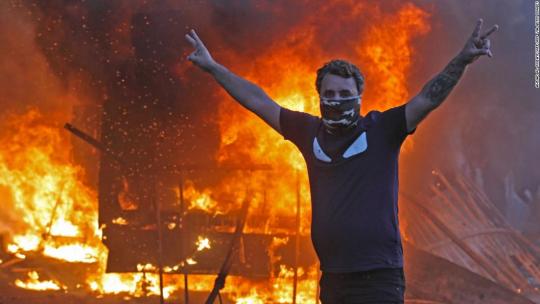
Beirut, Lebanon (CNN)Protests and clashes paralyze much of Iraq. Demonstrators in Lebanon block roads with burning tires and tear down posters of politicians.
This isn’t about regional rivalries, the Arab-Israeli conflict, terrorism or even a yearning for greater freedom.
This time it’s about the economy, corruption and the failure of elites and politicians (usually one and the same) to provide basic public services, and at least a glimmer of hope that the lives of ordinary people in these countries will improve.
Iraq’s wasted potential
Iraq should be a fabulously wealthy country. It floats on oil and has huge agricultural potential. But 16 years after the fall of Saddam Hussein, and two years after the defeat of ISIS, its economy is at best sluggish, unemployment remains high, it’s plagued by daily electricity cuts and the water in cities such as Basra is undrinkable.
Transparency International puts Iraq in the top tier of the world’s most corrupt countries. Bribes and graft, ranging from the petty to the stratospheric, are a fact of life.
In late 2017, then-Iraqi Prime Minister Haidar Al-Abadi warned that “the battle against corruption will be more dangerous than the battle against terrorism.”
He was right. Iraqis united and defeated ISIS. If the government of now-Prime Minister Adil Abdel Mahdi has entered the battle against corruption, it is losing.
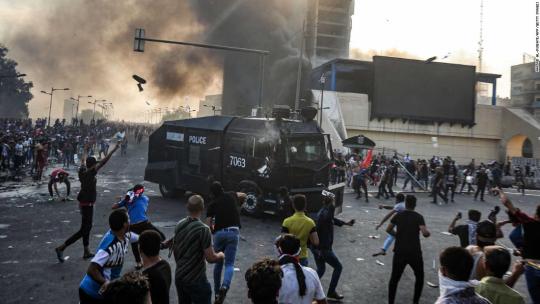
Grim reality in Egypt
For the past two weekends, Egyptians have suddenly re-emerged from their silence to protest against the rising cost of living and corruption by the generals who effectively run the government and key components of the economy.
The protests were sparked by videos posted by former actor and contractor Muhammad Ali, now in Spain, who detailed what he claimed were instances of extravagance, corruption and embezzlement by, among others, Field Marshall-turned President Abdel Fattah el-Sisi (Sisi has dismissed the allegations as “lies and slanders”).
The Egyptian economy is one of the fastest growing in the region, expanding by 5.6% last year. But the macroeconomic façade hides a grim reality: Finance Minister Mohamed Maait recently told Bloomberg that Egypt needs to grow by as much as 8% to absorb the two and a half million people entering the job market every year.
This summer the Egyptian government published a report on household finances indicating that a third of Egyptians were classified as poor, up from 28% in 2015.
Since coming to power in 2013, Sisi’s government has slashed state subsidies and the value of the Egyptian pound has fallen dramatically. The lives of ordinary Egyptians, never easy, have become even harder.
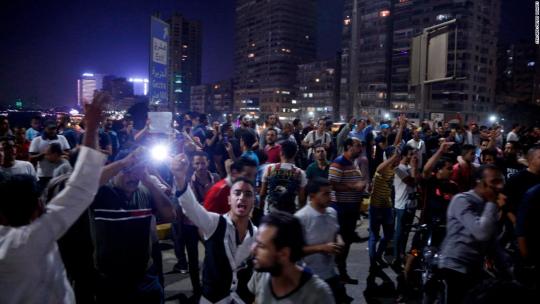
Lebanon loses ground
Ignore all the colorful stories you’ve read and reports you’ve seen about “hipster” Beirut and its glamorous, carefree nightlife.
Those who can actually afford it are a small, conspicuously consuming cosmopolitan minority. Almost a third of all Lebanese live below the poverty line, and more are falling below it every day.
Here I regularly hear tales of woe, of fathers desperate to find work for their university-educated sons and daughters, anything, anywhere; of people who simply can’t make ends meet.
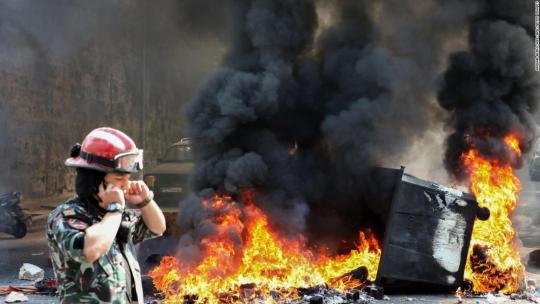
One acquaintance told me if the US or Canadian or Australian embassies started giving immigrant visas to everyone, Beirut would be a ghost town the following day.
Since the outbreak of war in Syria eight years ago, Lebanon’s economy has been struggling. The heart of Beirut, destroyed during the 1975-1990 civil war and rebuilt in the 1990s as a showcase of a city reborn, is largely empty. Almost all the fancy restaurants and upscale shops there have gone out of business. Stray cats outnumber the tourists.
Like Iraq, daily power cuts are a way of life.
Lebanon has one of the highest debt-to-GDP ratios in the world — worse than Italy. It lives off loans and occasional cash injections from the Gulf, but loans are becoming harder to come by and the handouts are drying up.
As a result, Lebanon’s currency, the lira, which held steady against the US dollar for more than 20 years, is starting to lose ground. The supply of dollars has suddenly dried up. In a country that lives off imports, that could spell disaster.
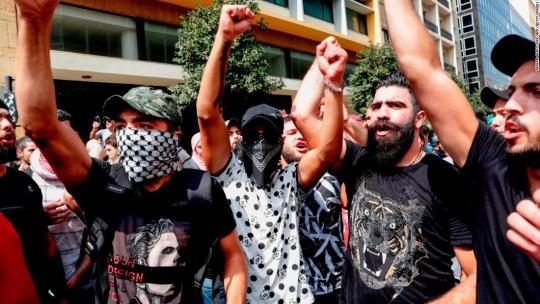
The Lebanese government recently declared a “state of economic emergency” and passed what is described as an “austerity budget.”
It all contributes to a growing sense among ordinary Lebanese that the economy is unwell, and that the poor, not the rich and powerful, will foot the bill.
There have been similar rumblings in countries across North Africa and the Middle East.
Rami Khouri, a senior fellow at the American University in Beirut, says that behind the unrest is “a politically disenfranchised Arab citizenry that has been humiliated by the disdain shown to them by their ruling elites, whose ineptitude and corruption can no longer be tolerated.”
Original Article : HERE ;
The post A new wave of Arab protesters say, ‘It’s the economy, stupid!’ appeared first on MetNews.
A new wave of Arab protesters say, ‘It’s the economy, stupid!’ was originally posted by MetNews
0 notes
Text
Enfrentamientos del Estado Islámico en Mosul, a dos días de anunciar su liberación
Enfrentamientos del Estado Islámico en Mosul, a dos días de anunciar su liberación
El primer ministro iraquí, Haidar al Abadi, había anunciado el lunes la liberación completa de Mosul, después de haber expulsado a los miembros del Estado Islámico (EI) de todos sus barrios, incluido el casco antguo en el que ahora se llevan a cabo combates entre las fuerzas iraquíes y milicianos yihadistas. El oficial Hazem al Bahadli, comandante de la Brigada Salah al Din, integrada en el…
View On WordPress
1 note
·
View note
Text
El primer ministro iraquí advierte de “graves violaciones” en las elecciones – RTVE.es
El primer ministro iraquí en funciones, Haidar al Abadi, ha asegurado que hubo “graves violaciones” en las elecciones parlamentarias del pasado 12…
copyright © 2016
youtube
youtube
youtube
from El primer ministro iraquí advierte de “graves violaciones” en las elecciones – RTVE.es via El primer ministro iraquí advierte de “graves violaciones” en las elecciones – RTVE.es January 21, 2019 at 02:51PM
0 notes
Text
The Antichrist Will Own war-torn Iraq
The Antichrist Will Own war-torn Iraq
Can elections change anything in war-torn Iraq? With a little confidence in the country’s political system, many ordinary Iraqis are likely to stay away from the ballot box while Shia-led parties like Muqtada al Sadr’s group are expected to dominate next month’s polls. The walls of Baghdad are covered with posters of Iraq’s former leaders, especially Nouri al Maliki and Haidar al Abadi, as the…
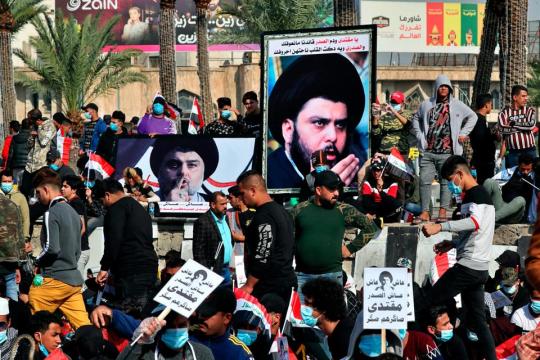
View On WordPress
#Andrew the Prophet#andrewtheprophet#Antichrist#coronavirus#Iraq#Moqtada#Muqtada#revelation 13#Sadr#the prophecy#theprophecy
0 notes
Text
Iraq To Seek Weapons From The United States Of America
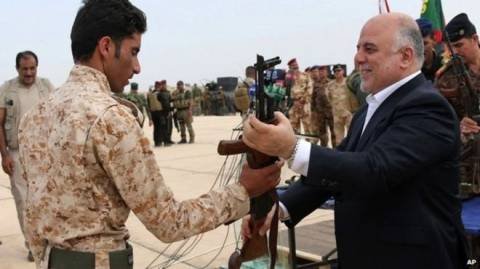
Iraq is hoping that the American weapons will help in the fight with the Islamic State, as the Prime Minister of Iraq will ask President Barack Obama for a multi-billion US dollars’ worth of weapons. Iraq is interested in the weapons, but will ask for a delayed payment.
The Iraqi Prime Minister, Haidar al-Abadi is concerned with the presence of terrorists of the Islamic State in the northern…
View On WordPress
0 notes
Text
Iraq militia commander Qais Khazali issues warning to American troops
Iraq militia commander Qais Khazali issues warning to American troops
Qais Khazali, a Popular Mobilization militia commander, threatened to target American troops in Iraq.
:: Qais Khazali, a Popular Mobilization militia commander, threatened to target American troops in Iraq and voiced rejection of America’s military presence in the country after they eliminated ISIS.
Earlier this month, Prime Minister Haidar al-Abadi said there was a plan to gradually decrease…
View On WordPress
2 notes
·
View notes
Text
In the document .. Basra calls on Ebadi to count the victims of the demonstrations martyrs
In the document .. Basra calls on Ebadi to count the victims of the demonstrations martyrs
[ad_1]
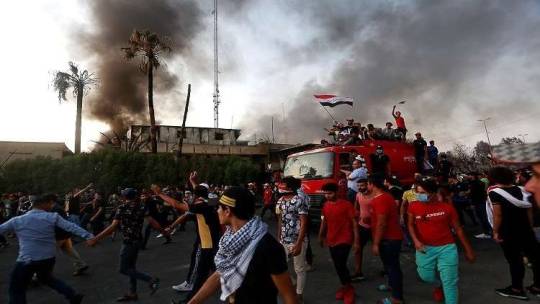
Basra Governor Asaad al-Eidani, Iraqi Prime Minister Haidar al-Abadi, accused the victims of the demonstrations in Basra martyrs to include their relatives privileges of the Iraqi Martyrs Foundation, affiliated to the prime minister.
"A group of our youth fell in the age of roses. Please take these martyrs as martyrs, and include them in the law of the martyrs'…
View On WordPress
0 notes